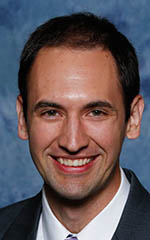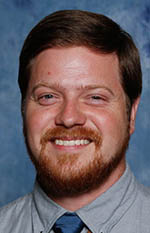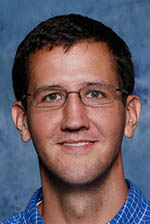By Rick Vacek
GCU News Bureau
It began with a College of Theology faculty conversation last spring about students’ most frequently asked questions.
And some of the biggest ones, according to the college’s dean, Dr. Jason Hiles, were about the Lord’s Supper: How often should it be available? Who can give it? Where can it be given? Should it be limited to Christians only? And, most important, what is it and how does it fit into worship?
The conversation continued Monday night in the latest installment of the Ministry Forum. Three faculty members presented different and yet in some ways similar views of Communion or the Eucharist: Dr. Joshua Greever argued for the Memorial view, James Waddell handled the Lutheran view and Dr. Shawn Bawulski spoke about the Reformed view.
Greever said the Memorial view is that Communion is simply a new covenant meal that is a remembrance of Christ’s death and an anticipation of His return. Greever likened it to a wedding, with the cross as the vows that begin the covenant and the Last Supper as the reception that looks forward to the marriage that follows.
Waddell, appropriately, read several quotations from Martin Luther in discussing the Lutheran view, which teaches Christ’s presence in the Eucharist. He pointed out that Jesus’ actions after the resurrection proved that His body is not restricted by human boundaries.
“His human body could vanish,” Waddell told the students in attendance. “Our human bodies can’t vanish — although some of us on test days wish they could.”
Bottom line, he said, is that Christ’s body and blood is a mystery, “just like the incarnation.”
In his presentation about the Reformed (John Calvin) view, Bawulski called the eucharist “the Gospel made edible” and said Communion is a sign and seal of our covenant with God. Rather than it being Christ's literal body, however, it is a spiritual gift given through the Holy Spirit.
We are making a meal with God, he said, adding, “The church is what it eats.”
Waddell said he wanted to organize and help lead this Ministry Forum because of his longstanding love of the Eucharist and what it stands for.
“I just always remember receiving it with a spirit of joy, lots and lots of joy,” he said.
And different views don’t mean that joy is lessened — that’s one of many things all three views have in common. It’s just that each view can point to different Gospel verses and interpret them in different ways.
As Greever said during a question-and-answer session after the three presentations, “I think there are significant similarities here. But there are Gospel issues at stake. That’s why we’re having this tonight.”
Those Gospel interpretations usually depend on the denomination. “Our view of the Last Supper is largely formed by the liturgy and practice of taking it,” Bawulski said.
Contact Rick Vacek at 639.8203 or [email protected].






































































